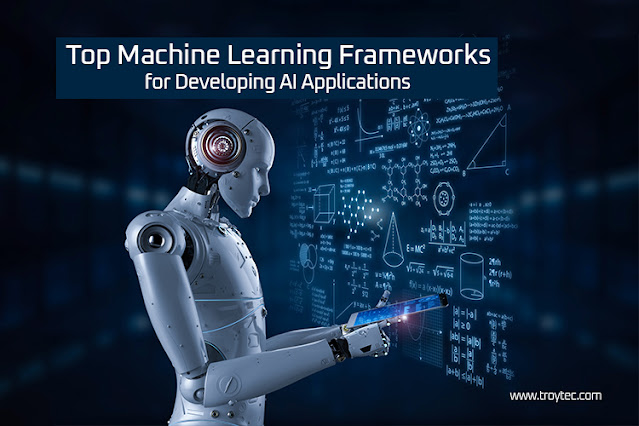Top Machine Learning Frameworks for Developing AI Applications
Top Machine Learning Frameworks for Developing AI Applications
Machine learning has become a crucial component in developing artificial intelligence applications. It allows machines to learn from data and improve their performance with experience. However, building a machine learning application from scratch can take time and effort. Machine learning frameworks have become popular among developers, providing a pre-built and efficient set of tools for building and deploying machine learning models.This blog will explore some of the top machine learning frameworks for developing AI applications.
- TensorFlow is one of the most popular open-source machine learning frameworks. Developed by Google, it provides a comprehensive set of tools for building and deploying machine learning models. TensorFlow is highly scalable, making it suitable for large-scale projects. It also supports various platforms, including desktop, mobile, and cloud.
- PyTorch: PyTorch is an open-source machine learning framework widely used in research and production environments. Developed by Facebook, it provides a dynamic computational graph that allows developers to modify the model. PyTorch is also known for its ease of use and flexibility, making it a popular choice among developers.
- Keras is a high-level machine-learning framework that provides a simple and efficient way to build and deploy machine-learning models. Developed by Francois Chollet, it provides a user-friendly API that allows developers to focus on model architecture and not the low-level implementation details. Keras supports both TensorFlow and PyTorch as backends.
- Scikit-learn: Scikit-learn is a popular machine-learning framework for data analysis and mining tasks. It provides a simple and efficient set of tools for building and deploying machine learning models. Scikit-learn supports many machine learning algorithms, including classification, regression, clustering, and dimensionality reduction.
- Caffe: Caffe is a deep-learning framework known for its speed and efficiency. Developed by Berkeley AI Research, it is highly optimized for convolutional neural networks (CNNs) and image processing tasks. Caffe is widely used in the computer vision community and is suitable for research and production environments.
- MXNet: MXNet is an open-source machine learning framework that is highly scalable and efficient. Developed by Amazon, it provides a flexible programming model that allows developers to build and deploy machine learning models on various platforms, including CPUs, GPUs, and clusters.
- Theano: Theano is a popular machine-learning framework that provides a simple and efficient way to define and evaluate mathematical expressions. It is highly optimized for deep learning and supports many neural network architectures. Theano is suitable for both research and production environments.
Conclusion:
Machine learning frameworks have made it easier for developers to build and deploy machine learning models. Each framework has its strengths and weaknesses, and choosing the right one depends on the project's specific requirements. The frameworks mentioned above are the industry's most popular and widely used.
.jpg)
.jpg)
.jpg)
.jpg)
Comments
Post a Comment